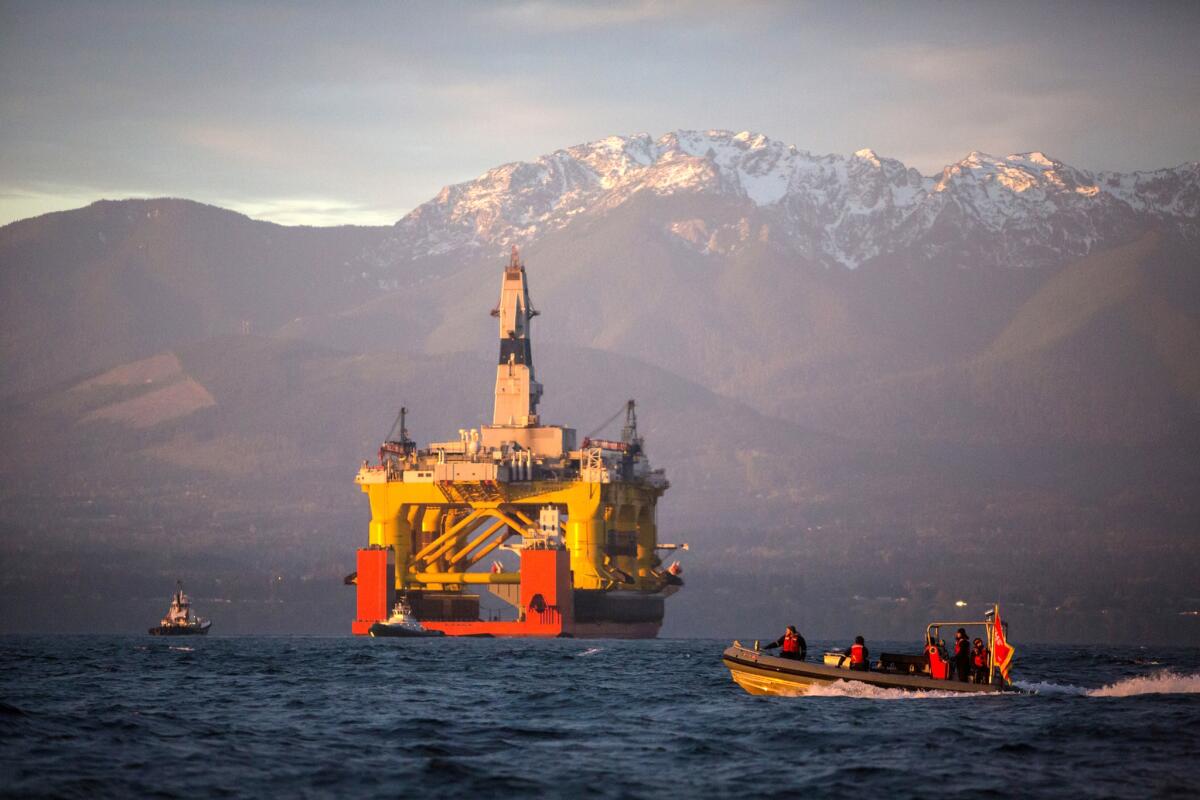Editorial: Off-shore oil drilling in the Arctic is still far too risky

A small boat crosses in front of an oil drilling rig as it arrives in Port Angeles, Wash., aboard a transport ship after traveling across the Pacific on April 17, 2015.
- Share via
When oil executives look at an offshore drilling rig, they see money. Environmentalists, though, see a disaster waiting to happen. The Obama administration should have listened more closely to the latter before including in its 2017-2022 drilling plan a proposal to allow three new offshore leases in Alaska, two of them in the Arctic Ocean. Yes, the Arctic Ocean, one of the most fragile natural environments in the world, where disturbances can have devastating impacts. In the event of a serious spill or leak, the region is so remote it would be exceedingly difficult to muster workers and equipment to contain the emergency. Long winters marked by sub-zero temperatures and an ice cap that shifts with the winds and the currents add a layer of complexity to cleaning up a disastrous spill. The risks clearly exceed the rewards.
To its credit, the Department of Interior simultaneously announced that it would abandon proposed Atlantic oil leases off Virginia, North Carolina, South Carolina and Georgia. That decision stemmed from a declining market for oil as well as opposition among coastal communities and the fishing industry. The Pentagon objected, too, over fears that the presence of drill rigs could interfere with military training and national defense efforts. It would have been nice if the government had acknowledged the environmental risks as well, but at least it reached the right decision.
Reducing our reliance on fossil fuels is neither an easy nor inexpensive transition, but it’s a crucial one.
U.S. policymakers need to focus more on that bigger picture: the environmental impact of energy decisions, especially as scientists warn that climate change will be taking its toll on the planet much sooner and more quickly than had been anticipated. (It is ironic that global warming has led to a smaller Arctic ice cap, which makes it easier and more enticing for oil companies to try to extract from beneath the Arctic Ocean more of the very fossil fuels that got us into this climate mess in the first place.)
The government’s most recent experiment with an off-shore lease in the Arctic ended in failure last year when Royal Dutch Shell spent $7 billion to sink a highly controversial exploratory well in the Chukchi Sea that failed to find significant amounts of oil and natural gas. The government then canceled additional planned lease sales and lease extensions in the Beaufort and Chukchi seas, citing low global oil prices and limited industry interest. And it continues to hold out the possibility of canceling the three proposed new leases, as well, if circumstances warrant. The government’s proposed 2017-2022 drilling plan also declares 9.8 million Arctic Ocean acres under federal control ineligible for drilling.
That’s good. But the government should close the entire Arctic Ocean to off-shore drilling.
Among the most pristine marine environments in the world, the Chukchi Sea supports such protected species as walruses, ringed seals and the spectacled eider, a sea duck. It also is home to half of the nation’s polar bear population. The neighboring Beaufort Sea also is a fragile home to polar bears, ringed seals and other species, and is important to a half-dozen types of whales. As we saw with the 2010 Deepwater Horizon disaster in the Gulf of Mexico, and the 1969 leak that covered 35 miles of coastline around Santa Barbara, offshore drilling is fraught with potential dangers that differ from land leaks, which are more easily contained and cleaned up. A recent federal study found a 75% chance over 77 years of at least one large spill from Arctic offshore wells. That’s an unnecessarily high level of risk just to add more oil spigots to the nation’s supply.
Especially since U.S. demand for fossil-fuel energy is down from a decade ago. And not just for oil. Coal-powered electrical production has decreased as reliance on less-polluting natural gas and renewable sources has increased. So the nation is moving, albeit late and slowly, in the right direction. Which makes this a good time to not only close the Arctic but also consider freezing new offshore leases elsewhere. (Existing wells — the vast majority of them in the western Gulf of Mexico — account for only 16% of the nation’s domestic oil supply.)
Reducing our reliance on fossil fuels is neither an easy nor inexpensive transition, but it’s a crucial one. Placing the Arctic off limits to drilling is an easy step, and the Obama administration should take it.
Follow the Opinion section on Twitter @latimesopinion and Facebook
More to Read
A cure for the common opinion
Get thought-provoking perspectives with our weekly newsletter.
You may occasionally receive promotional content from the Los Angeles Times.










